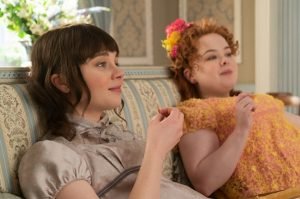By Rachael Friedman, Evaluation & Research Intern at REACH
“My name is Rachael, I use she/her/hers, and my answer to the check-in question of the day for what color I am feeling is… yellow!” This is the rhythm of PAVE (Peers Against Violence Educators) meetings every week as we reacquaint ourselves and each have an opportunity to share how we are arriving to the virtual space. After check-in, we move on to the X-report – a part of the meeting to share what is happening at school or in current events and pop culture related to the topics of our group.

Recently, the show Bridgerton came up as a topic of conversation during the X-report. Although not all of the students had seen the show, all had heard of it, as it’s currently the number one show on Netflix. The show takes place in Europe in the early 1800s, which might sound like it wouldn’t be relatable to a group of teenagers, but the show’s inclusive casting of people of color, string quartet renditions of present-day songs, and incorporation of conversations around sex and gender make the show feel relevant. The PAVE peer leaders were quick to point out the similarities between what the characters on the show are going through and the experiences in their own high school.

What sticks out to me in Bridgerton is how little the young characters on the show know about sex. Two of the teenage characters, Penelope and Eloise, spend much of the first part of the season trying to learn how to avoid getting pregnant because they have goals outside of marriage and babies. The girls spend the episodes secretly asking maids and cooks about how a woman becomes pregnant because they are too afraid to ask their own parents. On the show, this is played for laughs, but the reality is much less amusing. The characters want to empower themselves with knowledge in order to make informed decisions about their bodies, but they are not educated on the subject and have to learn everything on their own. The modern day equivalent to this situation would be teens searching the internet for answers because they do not have a trusted adult to ask. In both scenarios- the show and present-day- the result of seeking out material in this manner can lead to misinformation which puts the teen at risk.
As shown in Bridgerton, parents may want to talk to their children about sex but may not know where to start. Daphne’s (another character from the show) mother attempts to have “the talk” a couple times over the course of the show, but becomes uncomfortable and dismisses the subject as an “improper topic of conversation.” This leaves Daphne confused and prevents her from confiding in her mother when she is in challenging situations. It is normal to feel anxious or uncomfortable about bringing up the topic of sex with your children, but despite what is shown on the show, it is not a one time, big conversation. Ongoing conversations and modeling consent and healthy relationships can start when children are at any age. Respecting your child’s space and teaching them to set boundaries with others is having “the talk”. Asking your child about their friendships is building trust so that they know they can come to you if they ever need support. To start this conversation with a young person in your life, you can ask “What qualities do you look for in your friendships and romantic relationships?” or “What do you know about sex, and what questions can I answer for you?”
Ideally, sex education is a partnership between schools and parents. The two complement each other in a circular fashion. Schools build on the information students have already learned at home, and parents continue the discussion by asking the child what they are learning in school. This process works best when parents take an interest in the curriculum being taught. In Massachusetts, sex education curriculum in public schools varies. Some schools do not teach sex ed at all and some offer abstinence-only education. I am hopeful about The Healthy Youth Act, a Massachusetts bill which will require public schools to teach comprehensive and LGBTQIA inclusive sex education that covers preventing STIs and unwanted pregnancy as well as healthy relationships to create a culture of consent. The bill has passed in the state Senate but still needs to pass in the House. You can learn more about this bill here and show your support by contacting your representatives to encourage them to introduce this bill to the House for debate.
PAVE meetings close with a check-out question. It is a time to be reflective about our meeting and look forward to the future. As Bridgerton’s omniscient narrator, Lady Whistledown, would phrase it: my question to you, dear reader, is “What lessons will you take with you?” Think about how we are in February, Teen Dating Violence Awareness Month, and how it is opportune that a show like Bridgerton, that millions of people are watching at the same time, is on our minds right now. While it is a fun escape that everyone can use right now, I hope that it also sparks conversation between parents, teachers, and teens about gender roles, consent, and healthy relationships.
For more information about how to talk to your child about healthy relationships please visit loveisrespect.org, thehotline.org, or you can use our online chat to talk with one of our highly trained staff or volunteer advocates.





